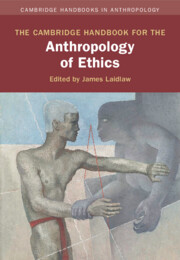Book contents
- The Cambridge Handbook for the Anthropology of Ethics
- Cambridge Handbooks in Anthropology
- The Cambridge Handbook for the Anthropology of Ethics
- Copyright page
- Contents
- Contributors
- 1 Introduction
- Part I Intellectual Sources and Disciplinary Engagements
- Part II Aspects of Ethical Agency
- Part III Media and Modes of Ethical Practice
- 16 Self-Cultivation
- 17 Exemplars
- 18 Ritual
- 19 Values
- 20 Rules
- 21 On Ethical Pedagogies
- Part IV Intimate and Everyday Life
- Part V Institutional Life
- Index
- References
21 - On Ethical Pedagogies
from Part III - Media and Modes of Ethical Practice
Published online by Cambridge University Press: 11 May 2023
- The Cambridge Handbook for the Anthropology of Ethics
- Cambridge Handbooks in Anthropology
- The Cambridge Handbook for the Anthropology of Ethics
- Copyright page
- Contents
- Contributors
- 1 Introduction
- Part I Intellectual Sources and Disciplinary Engagements
- Part II Aspects of Ethical Agency
- Part III Media and Modes of Ethical Practice
- 16 Self-Cultivation
- 17 Exemplars
- 18 Ritual
- 19 Values
- 20 Rules
- 21 On Ethical Pedagogies
- Part IV Intimate and Everyday Life
- Part V Institutional Life
- Index
- References
Summary
In the empirical exploration of ethical pedagogies, a quartet of themes are salient. The classic theme of and debate over the relative weighting of nature over nurture is inescapable. A second concerns the extent to which any given repertoire of norms, values, exemplars, and ideals are written in sociocultural stone versus the extent to which they are malleable, fluid, of unstable valence, and liable to elimination or supplementation. A third concerns the degree to which the techniques of the ethical pedagogue are informal or formal. A fourth concerns the place that ethical students occupy within the dynamics of incorporation and objectification. Neglect any of these themes and infelicities can result. Among them, the crucial role that childhood socialization plays in ethical formation might not receive the acknowledgement it is due. The distinction between ethics and ethos might suffer conflation. Worst of all, the anthropologist of ethics might run the risk of slipping into methodological or – even worse – ontological individualism. Proper attention to ethical pedagogies can ameliorate such infelicities. It can also facilitate recognizing that pedagogies, at whatever stage in the life course, are foundational to ethical formation, deformation, and reformation.
Keywords
- Type
- Chapter
- Information
- The Cambridge Handbook for the Anthropology of Ethics , pp. 536 - 558Publisher: Cambridge University PressPrint publication year: 2023

